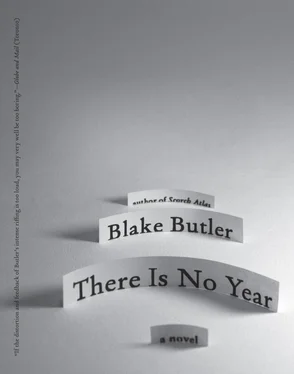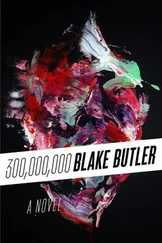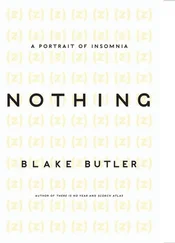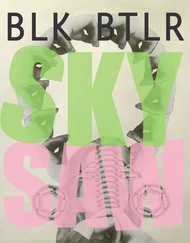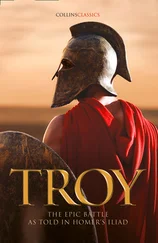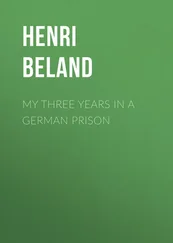The son did not want not to touch the phone but the house would not be quiet. He went and got the phone where the bathroom was now raining dust. There were hundreds of him even in that mirror.
He went and lay down on the mattress with the phone against his chest.
The son felt sick again.
The son tried to call the mother’s name but he heard his voice stay hung inside him, gushing in his gush.
The mother stood on the back lawn. The grass grew to her waist. She had her wet arms up over her head. Something flat above her — something there — she could almost touch it — could almost pull it down. A kind of skin or greasy fabric. Gash. A veil. She kept reaching. Her arm muscles began to stretch weird. Each time she brought her hands back down from reaching she felt her elbows bobbed a little further out. Bowed. Redistracted. Her pupils spacing outward, going lazy. She was so big now. She couldn’t keep her hands from making knots. She couldn’t keep her knees between her legs. The thing — perhaps an awning — was flattening the house.
Like the mother’s body, the house all seemed to sag. The roof slid sloppy. The doors expanding. In countless windows the glass reflected the grass and gravel back onto the yard. A dead horse appeared in some parts of the reflection, its horseflesh buzzered and warped to gleaming waves from nonexistent heat. The mother’s mother crouched down on the horse’s back, holding the egg against her chest. The egg glowed, singeing the night. The mother shouted at the mother’s image, seething — all those years and years buried between — the mother’s mother having made the mother and then left her in the air of every day, such silence — the new flesh they had made, in passing on.
From the mother’s throat, instead of voice now, up through her chest there came a key — another key that opened nothing— smooth teeth —each further word a key and key again, their metal raining from her mouth in exclamation to click against the ground — and in turn to turn to further birds there, bursting, one and another, a white excrement, alive — each bird flying right after the other straight up and head-on into the thickening awning of the sky.
The mother shouted at the awning, keys erupting, uncounted birds in muscled shriek. She needed to pull the awning down, she knew, and knew she knew she would not. The stink of skin coursed new all through the air just beneath the edge of air where the long sky grew, growing hair, a body, trust.
Among the birds, the mother screamed another name. Her nostrils made little rooms for sluicing, her throat skin rawing into blood. Her skin pocked with insects that poured out from her brain, born from other, tiny eggs. There were gnats and ants and bees and beetles. There were flies of every color. These too flew to become something — of the awning, and the ground. The mother could not count herself, the shake inside her. More insects settled on the air — insects both from her and in the world compiling. They made it hard to blink, or want. Each little tic of need and knowing begged so much thought. The mother — she could not — hardly — inhale — she could not — see. She pulled her outermost clothes up over around her head, a mask. She breathed into the scummy cloth. The mother reached for names she’d heard there, those women and those men. The mother reached.
The son heard the hall door open and saw someone standing in the hall. This time the son did not hide or close his eyes, though he could not see through them quite clearly. The room was fuzzed. The son’s arms were flexed as if for lifting. The figure in the hall stood unmoving for a long while. The son and the figure saw each other. The air around them seemed so empty it had no space. The son began to cough. The son could not move his head or hands and so instead hacked with his head back on the mattress, blooming germ-rind up above him. The son felt something metal in his mouth. The son coughed and coughed and spat a key. The key fell into the divot of his neck above the cell phone. The son’s chest began to twitch. The key was sinking. The son saw the figure had come forward slightly. He saw the figure had a gown — or not a gown but some large curtain — or not a curtain but a cape — or not a cape but something muddy, something thin and flat and woven. The son felt the ants burrowed inside him skitter through his lungs dry like a hive.
The window light swung through quick cycles as the son watched the form emerge. The light and dark of sun and absence swam back and forth accelerated. The lip of light moved up the wall in shafts like blinkers, exposing the crudded sections where the son had hung the crud of his achievements. Among the light the form moved closer. It came in inches. It made no sound. The son could still not see. Even as the wash of light moved across the form, the son could not make out anything about it. The form’s features were blurred or runny. The son blinked and blinked his eyes.
Sometimes between sets of blinking the son saw in the form’s place an upright furry rabbit — a very young girl — an older man in a ratty yellow shirt, so hunched he could not stand. The son saw older versions of himself — much older, already balding, multi-tattooed from head to foot, carrying a book. Each of these ideas, though, remained replaced by the progressing form each time the son would blink. The son could not keep his eyes apart from one another. The son could not feel his feet.
Over time the figure proceeded and the son began to learn the figure’s face. He could see the face and sensed a squirm a scrunch a need for recognition. Someone certain. Someone nearby. Someone the son had learned to love, though in a distant, ingrained method. The son had seen this person every day. He knew the smell. He knew the inches of the fabric of the thing the figure carried forward and wore all draped around it. The fabric was made of meat and blood and things undone and hair and years and wanting and a special blend of polyester. The son knew the figure’s name inside him. The son felt something welling through his skin.
The cell phone was ringing so hard through the son now that he could feel the impending conversation. He could hear what the person on the other end would be saying and he could hear his voice reply. He’d heard those words a billion times too. He heard them every time he slept. He said them in dreams of people he did not know yet. He said them in very tiny rooms. He spoke them out into the bedroom also. The bedroom’s walls had absorbed so much. The son wanted to touch the bedroom walls again. The son wanted to stand up. The son’s skin was getting ugly. A bubble flooded on his neck. He popped the bubble with his finger. Another rose. He popped and popped. He could feel the hemming of his lines, becoming sizes. He could feel his last haircut aching in the tendrils of the hair he sometimes — like the father — devoured in his sleep. In his sleep the son had eaten more than anyone could ever. There was so much in the son. The son could kill a forest if he shaved. The son could cripple nations. The son could sew designer jeans out of his runoff.
Everything.
The son could hear the prior homeowners’s pets, which were endlessly buried in the backyard and underneath the house and sometimes even under the gravel of the driveway or in the carpet underneath the son’s bed.
The son’s skin was coming off.
The figure stood closer. The fabric the figure had unfolded stunk and filled the room. More beef. A little cream. Graham crackers. The son loved graham crackers — he liked the crack between teeth — he’d eaten enough to build a mall — the figure knew this. The figure had a mouth, the son could see that, he could see inside the mouth. The son could see the room flooding with liquid. The son could see the apartment the figure rented in the figure’s chest.
Читать дальше
